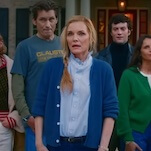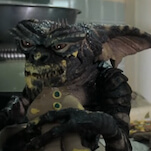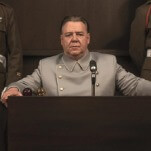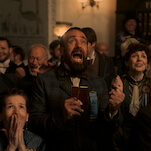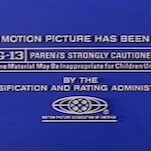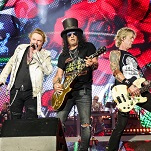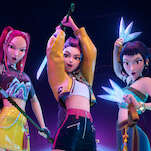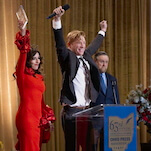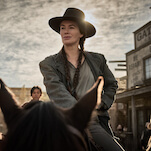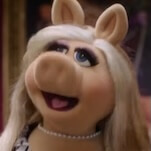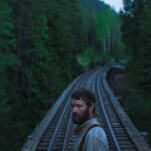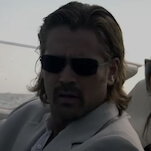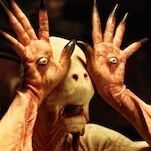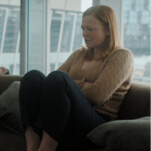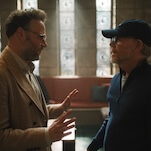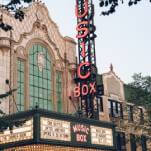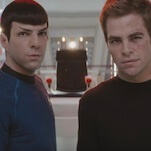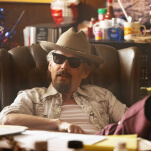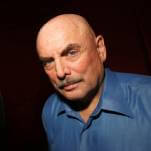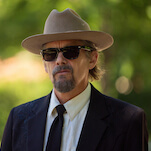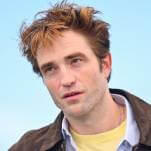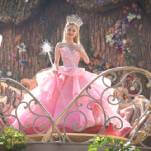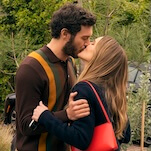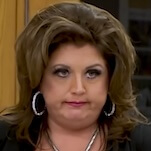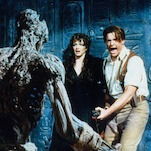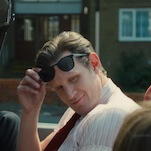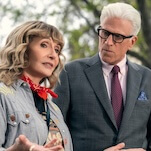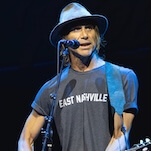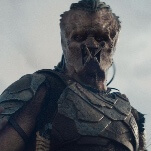Michael Showalter
Ever since his days on MTV's sketch show The State, Michael Showalter has practically defined "cult appeal" with projects like the summer-camp movie spoof Wet Hot American Summer, the anti-romantic comedy The Baxter, the deliberately awkward online chatfest The Michael Showalter Showalter, and—with frequent collaborators Michael Ian Black and David Wain—the anarchic, Marx brothers-esque troupe Stella. With the recent release of his CD Sandwiches & Cats, Showalter has added stand-up to his résumé, combining improvisational riffs with uncomfortable confessional humor in a signature stupid-smart way that should be catnip to his fervent fan base. During a break from a co-headlining tour with Black, The A.V. Club caught up with Showalter to talk about his myriad projects (including that buzzed-about State reunion), the reason he doesn't like performing in comedy "stores," his indie-rock credibility, and why Dane Cook makes him laugh.
The A.V. Club: Let's just get this out of the way: When will DVDs of The State come out?
Michael Showalter: I don't know, actually. Don't have an answer for you. They have it. We've made the DVD, and it exists. It's out of our hands, and I know who has it, but I don't know why they're waiting. I only know that they are waiting. The whole DVD issue is something that I don't really think about, because it's so not in our control. I know people are eager to get it and everything, and we've done the commentary and the deleted material and all that stuff, but I just don't know when it's coming out.
AVC: You caused quite a stir recently by announcing that The State was reuniting for a movie about American history. What can you tell us about that?
MS: Well, that's pretty much it. You just said it. We're doing a movie, but because of the writers' strike, there's not much we can do at the moment. But we're definitely reuniting.
AVC: What stage is it in?
MS: We're just exchanging ideas right now.
AVC: So we can expect a full reunion?
MS: I think so, yeah.
AVC: When The State ended, it seemed like there were two camps that broke away: Stella and Reno 911! Is that indicative of two smaller group dynamics within The State?
MS: Probably. I think it also has as much to do with us choosing to stay on the East Coast versus the West Coast. Some of us just chose to stay in New York vs. L.A. But no, when we were on The State, everybody worked with different people. It just sort of happened that way. Ben [Garant] and Tom [Lennon] are definitely writing partners, and that explains that. Mike, David [Wain], and I were all on the East Coast doing Stella. Right now, Ken Marino and David are working together a lot, and Michael Black and I are working together a lot. I think that perceived division has as much to do with geography as anything.
AVC: Were you ever asked about being involved with Reno 911! prior to your appearance in the movie?
MS: No.
AVC: Has your relationship with anyone in The State changed since the split?
MS: Only in the way that things change as a result of time-passage. We don't see each other as much as we used to. We used to be together 24/7 for quite a while, and now half the group lives in L.A., so I don't see them. But other than that, no.
AVC: What's happening with The Michael Showalter Showalter?
MS: I just did four new segments for that. Jack McBrayer from 30 Rock, a comedian named Mike Biribiglia, Michael Cera, and the cast of Human Giant. Those are rolling out over the next few months.
AVC: Because of the strike, networks have been turning to online content to fill their schedules. Would you be open to developing TMSS as a TV show?
MS: Definitely. The project that I'm doing with Michael Black has a lot of similarities to that.
AVC: You've also hinted that there's more to come from Stella. Anything you can elaborate on?
MS: I said that? Well, I think we're hosting a Barack Obama benefit in New York, but other than that, not really.
AVC: Is Barack Obama a Stella fan?
MS: I doubt it. I doubt he's ever even heard of us.
AVC: Considering you and Michael Ian Black tour together so frequently, what's stopping you from doing another Stella tour?
MS: I think Mike and I both just want to do stand-up right now.
AVC: You didn't start out doing stand-up until a couple of years ago. Have you had to work at it to find your rhythm?
MS: Yeah, and I still consider myself very much a neophyte. I also don't really think of myself as being a traditional stand-up. But yeah, it's kind of an ongoing thing.
AVC: Did you study anyone in particular in developing your act?
MS: No one in particular. There are comedians that I like. I think a lot of it, you just figure out on your own. It's definitely one of those things that you get good at by doing it a lot. But I like Jim Gaffigan. Patton Oswalt. Janeane Garofalo. I like the comedians that go into detail and tell longer stories.
AVC: What made you want to jump to stand-up after doing sketch for so long?
MS: It was just another medium of comedy that I wanted to try. I like doing all different types of comedy—stand-up, sketch, movies, TV. I like to try everything.
AVC: Is being alone on stage harder than working in a group?
MS: Actually, I like it. It's free-er. I tend to a lot of improvisational ranting, and that's fun. For me, stand-up has been, performance-wise, a really good outlet. Making Stella was difficult, because it's very complicated—a lot of choreography and camera work. Which is why The Michael Showalter Showalter was specifically designed to be easy to shoot.
AVC: You're part of a new breed of comedians who prefer performing in music clubs to traditional comedy clubs. What is it about the "two-drink minimum"-type places that you find unappealing?
MS: I wouldn't say I find it "unappealing," but I guess I don't personally feel comfortable performing in a comedy club, mainly because as an audience member, I've never enjoyed that experience. It feels a little bit theme-park-ish to me, in that it's a club whose product is comedy. I find that weird. It's like those specialty chocolate stores, where everything is chocolate. It's too specific. I like going somewhere that specializes in variety.
AVC: Your press kit calls you the "Billy Joel of comedy." What does that mean?
MS: It means nothing. I did that promotional poster, which is a take-off of 52nd Street, and it just seemed like the appropriate line to put on there. In some weird way, I think maybe I am the Billy Joel of comedy, although I have no idea what that means.
AVC: So maybe in 10 years, you'll only be doing "classical" comedy?
MS: I guess so. Or crashing my car into trees.
AVC: Does that make Michael Ian Black the Elton John of comedy?
MS: You'd have to ask him, but probably yeah. Or maybe the Todd Rundgren of comedy. If you're gonna print something, I'd prefer Todd Rundgren, so people will have to Google "Todd Rundgren."
AVC: What are the advantages of touring as a package with Michael?
MS: He and I get along very well, and we're working on other projects while we're on tour. I think it also creates a better bill. And we help each other a lot with our material, giving each other feedback, or playing around together onstage. Keeping it moving.
AVC: Do you guys ever get sick of each other?
MS: No. We've known each other now for 20 years, so part of the reason we do it is we don't get sick of each other. I'm sure there are things about me that annoy him. I'm chronically late and always losing things. I smoke cigarettes, and I know that bothers him.
AVC: Can you ever see yourself heading out solo?
MS: I'd like to, eventually. But right now, this is working out.
AVC: Patton Oswalt and David Cross recently had an online debate about Cross' appearance in Alvin And The Chipmunks. You've so far managed to avoid cashing easy paychecks in crappy movies. Is that a conscious decision?
MS: Not at all. If I could have done a role in Alvin And The Chipmunks, I would have, 100 percent.
AVC: Do you often go on auditions?
MS: I have the opportunity to audition for some of these things, but I tend not to. Not for artistic reasons, but because I know I won't get the part. It just feels like a waste of time.
AVC: It's more a matter of low self-esteem than integrity?
MS: Not low self-esteem, but reality. I've just auditioned enough times to know that I won't get the part.
AVC: Is there anything you didn't get that you're upset about?
MS: I really wanted to play Will Arnett's role in The Brothers Solomon. I'm not saying that I was close at all, but I put a lot of effort into auditioning for that movie. I thought it was an absolutely hilarious screenplay, and I would have loved to have been in that.
AVC: Many of your State alums—including Michael Ian Black—regularly appear in commercials. Is that something you would do?
MS: I did a few commercials many years back. It would really depend. I'm not very big on appearing in commercials, so in general, I don't audition for "on-air" commercials—the ones where your face can be seen. I've auditioned for voiceover campaigns that I haven't gotten, but I don't really want to be seen in a commercial unless it's a product that I really love. Like, if Adidas asked me, I would do it in a heartbeat. But many years ago, I did a Reebok commercial, one for Pep Boys, one for Dunkin' Donuts. During some of my leaner years, I auditioned for commercials, but I really couldn't stomach it. It just didn't feel right. But that's not a judgment. I don't want to disparage my colleagues who do that. It's a totally personal thing.
AVC: For the comedy blog The Apiary, you wrote about how comedians actually love heckling, because it gives you an opportunity to "uncork your anger" and get laughs. Do you worry that by going on record as the "guy who loves hecklers," you're asking for trouble?
MS: I hope not, and it wasn't a coincidence that I put that on The Apiary, and not Pitchfork or something. I didn't feel like billions of people would be reading The Apiary. And I think I specified that there are two kinds of heckling: There's "you suck, I don't like you, you're not funny" heckling. That's not good heckling. That kind of heckling, no one really likes. There's a way to work with that, but on the whole, if I get a lot of "you suck," I will most likely shut down. The other kind is, "Look at me! Even though I'm not performing, I want attention!" That's good heckling, because that person is a very easy target, and you can go 10 minutes on humiliating that guy. But you have to walk a line, being extremely, unrelentingly mean to him and keeping it where you aren't actually hurting his feelings, or making it so the audience feels like it's gotten uncomfortable—which is a fun line to walk. You're uncorking anger, but not so much that the audience is like, "Wow, he's really upset." The "Cats" segment on my record is a good example of that.
AVC: Speaking of that, had that woman not turned up with those cats, what would have filled those minutes on your album?
MS: Shitty, way less interesting stand-up. There's at least half an hour's worth of material that I didn't put on that record that would have been fine, but I was very happy to have something like that on there. That was kind of my concept going in, to have a comedy record that was different. I was thrilled.
AVC: Did that woman get thanked on the album?
MS: Well, we named the album after her. Isn't that enough? What do you want me to do, go track her down and send residuals? Who are you, anyway? It's not enough that we name the record after her? What are you, her friend?
AVC: I don't think so. Probably not.
MS: Are there any other ideas you have as to how I should do things that you'd like to tell me? Any other suggestions? We're MySpace friends, so just feel free to send them along, okay?
[pagebreak]
AVC: So now that you have a CD, it's likely that a lot of your audience will have heard it before coming to see you. Do you try to avoid doing bits from your record live?
MS: Yes, unless it's a city that I've never been to before. I'm not going to tell you how many CDs we've sold, but I know the amount. I think that it's doing well in terms of what the expectations were, but relative to what most records sell, I'm not worried that too many audience members are going to know it. That said, if I've been to a city a number of times, I try to do as much new material as possible. I try to do new material as much as possible all the time.
AVC: Part of your album talks about your teenage years, when you tried to be a poet. When did you outgrow that serious Beat phase and turn to comedy?
MS: Pretty much when I got to college, and I realized that there were other things. But my Beat phase started to shift toward the end of high school. Sophomore and junior year were my big Beat-poet years—although I guess The Cheshire Cat was my senior year. But it was college when I started doing comedy. I started to see the humor in it.
AVC: Before that, did you have an idea that you were funny?
MS: I thought I was funny, but I would say that growing up, my humor was appreciated, relatively speaking, the same way that it is now. Which is that a minority of people thought I was very funny.
AVC: Did your high school hip-hop/comedy group The Disposable Rappers start off serious?
MS: I was kind of in an experimental phase with The Disposable Rappers. This is boring to me, because it's true, but when I was a sophomore in high school, I visited my sister in college and saw an improv troupe, and that was a genuine moment for me. It was an actual "Aha!" moment. After I saw that, I said, "I want to do comedy." So The Disposable Rappers started doing improv in addition to rapping, and when I went to college, I very specifically went saying "I want to join a comedy group."
AVC: And how did what became The State get together? Was there an open audition, or did you meet one person at a time?
MS: I was in the School Of Arts And Sciences at NYU, and the only reason I mention that is that if I had been in a different dorm, I probably never would have met those guys. Joe Lo Truglio lived across the hall from me, and he was in the Tisch School, the film school. We met on the first day and bonded, and he had seen flyers for auditions for the NYU sketch group, The Sterile Yak. Which is a hilarious name. It's like a yak, but it's sterile.
Anyway, the flyer said, "Come watch our show, and then we'll have an informal meet-and-greet, and then there will be auditions." So I went and saw their show, and they were like Saturday Night Live in its first season. It was the biggest deal. It was packed, and they were cool and older, and they were campus celebrities. Then they had this informal meeting. Basically, it was an hour of them telling a bunch of freshmen how awesome they were, and how hard it would be to get into their group. Sitting in the audience, as freshmen, were me, Joe, Kerri [Kenney], Mike Black, Ben [Garant], and probably a few others. In The Sterile Yak was David Wain. He was, like, the Bill Murray of Sterile Yak, the hilarious crazy guy. They were sitting on tall stools, and they took turns telling the freshmen how difficult it would be to get in, but that it was worth the effort. I was very turned off, because I don't like being rejected, and they were basically saying, "You're going to be rejected."
At the end of the meeting, Todd Holoubek came in late. He was also in The Sterile Yak, and he announced that he was starting a second troupe, because in order to maintain their status as an NYU activity and receive money from the school, they had to take on more members. So they started a JV squad. To make a long story short, everyone that was in The State—which was then called The New Group—didn't even audition to be in The Sterile Yak, and I think the reason for most of us was that we didn't want to not get in a group. The primary reason that I auditioned for The New Group was that I had a better chance of getting in, because there was no group. [Laughs.] We all auditioned for The New Group, and at the first meeting was me, Joe, Mike Black, Ben, Ken Marino, Todd, Kerri, and then David left The Sterile Yak and joined us. Then Tom Lennon and Kevin Allison joined sophomore year, and Michael [Patrick] Jann joined senior year.
AVC: What made David leave The Sterile Yak and join you guys?
MS: Because we were better, and he knew it. We did our first show that fall, and I gotta say, we were pretty good. David saw that and said, "I'm in the wrong sketch group." The Sterile Yak did one or two more shows, and that was it.
AVC: You killed them off?
MS: Kind of. I like to be humble, but we were very good. Considering our age and lack of experience, that first show was funny. And the thing that was different about us than other groups, and probably a big reason why we were able to and have been able to continue to succeed is that we had a very intense work ethic, right from the beginning. There was a do-or-die attitude toward the work. It wasn't seen as a little "club." It was like, "This is your life." We would spend hours and hours rehearsing and endlessly rewriting. We took it very seriously right off the bat. And we were also extremely critical of each other, which was another thing that was unique. A lot of comedy ensembles have a hard time being critical of each other, because they don't want to hurt each other's feelings.
AVC: By turning up at things like SXSW and Sasquatch, collaborating with Craig Wedren of Shudder To Think, and so on, you've earned this indie-rock credibility, yet in your act you talk about how the music you actually like is stuff like Dave Matthews Band, Sheryl Crow, Train. So which one is the lie?
MS: Well, if I have indie-rock credibility, then I have indie-rock credibility, right? Is that a lie? I definitely like some of those artists that you just mentioned—although the only Train song I like is the one that I play in my act ["Drops Of Jupiter"]. Sheryl Crow has three or four songs that I like; also Dave Matthews Band. With those particular musicians, it's more that there are a few songs that I like rather than their entire body of work. There are a lot of indie bands that I like too. I'm not a snob about music. I'm listening to Grizzly Bear right now. I love Grizzly Bear. But I also really like Kate Nash, who's sort of like Lily Allen. And the other album that I've been listening to nonstop is the soundtrack to Sweeney Todd, because Johnny Depp is a very good singer, and I love the music. Does the fact that I like Stephen Sondheim and Broadway musicals make me a fake? I don't know. It's not for me to answer. Does the fact that I'm "the Billy Joel of comedy" mean that I don't have indie-rock credibility? It's not for me to answer. Do I like The Shins? Yeah. Do I like Bright Eyes? No, I don't. At all.
AVC: Why not?
MS: He takes himself too seriously. Do I like PJ Harvey? Yeah, I love PJ Harvey. Do I like Clap Your Hands Say Yeah? No, I don't. Do I like Cat Power? I love Cat Power.
AVC: In your act, you say all of your Cat Power tracks are actually Sheryl Crow songs.
MS: That's fiction. That's the lie. I also said that I have Journey stored under Sufjan Stevens, which is also a lie. Do I like John Mayer? I love John Mayer. Love John Mayer. John Mayer is someone whose entire body of work I like.
AVC: He's also an aspiring comedian. Would you ever want to tour with him?
MS: Absolutely. 100 percent. His phone number is on my phone, and he's waiting for me to call him to do something together. Why haven't I called him? I'm too intimidated. I'm star-struck. He's like a huge, giant rock star, and I've listened his albums thousands of times. Why wouldn't I be intimidated by him? It's very random who I would meet that would intimidate me, but he's definitely one of them. If I met Sean Penn, would I be intimidated?
AVC: Yes?
MS: No, I wouldn't be. He's too obvious. If I met Steve Martin, would I be intimidated?
AVC: I'll say "No."
MS: Very. I would be very intimidated.
AVC: I suck at this game.
MS: Terribly.
AVC: Speaking of music, can we ever expect to see The Doilies become a full-fledged band?
MS: I would like that. We haven't written a lot of stuff, but that is something I would like to do. We just haven't gotten around to it.
AVC: During this strike-imposed hiatus, maybe you could.
MS: That's a really good point. I'm working on some other things, though. I'm writing a memoir. I'm four pages in. I start with my first memory, which is kicking my uncle in the balls. I was four.
AVC: How'd he take it?
MS: Not well. He committed suicide. It's all starting to make sense now, right? You see the layers being peeled off the onion. My first memory was of me kicking him in the balls, and it did not go well. It was the first of many awkward life moments. You see the layers of meaning there, right? He ended up killing himself, and maybe I've thought about that too at some point. Maybe I have something to say about that later in the story. I'm building a patchwork quilt, see?
[pagebreak]
AVC: You've done a blog for Deadspin. Have you always been a big sports fan?
MS: Yes. I know more about sports than I know about any other subject, unfortunately. I'm embarrassed to admit that. You could pretty much ask me anything, and I'll tell you a little bit about it.
AVC: Tell us about cricket.
MS: I know a lot about cricket. You were joking, see? You were like, "I'm going to ask him about something he knows nothing about." But I know a lot about cricket.
AVC: Well, you haven't actually told us anything about cricket yet.
MS: Well, what do you want to know?
AVC: Who invented cricket?
MS: I don't know. But I could tell you who some of the best cricket players are.
AVC: Okay, so who's the best cricket player today?
MS: I don't know. However, I can tell you that one of the best cricket players of all time—and I would really equate him to Mickey Mantle, maybe even Joe DiMaggio—is [Arif] Imran Kant. Google it. He was the best cricket player for Pakistan. He's now an opposition leader in Pakistan, and he's in exile. His ex-wife—and this is a piece of information I wish I didn't know, but I'll tell you anyway—is the recent ex-girlfriend of Hugh Grant.
AVC: You're not just reading this off Wikipedia, right?
MS: No, I'm not. Why would I do that? I don't bullshit. I wouldn't lower myself to that. I'll be the first person to admit that if you'd said, "Tell me something about hockey," it would have been a short conversation. Boxing, that could be a long conversation. Baseball, basketball, football, tennis: long conversation.
AVC: Were you ever an athlete?
MS: I am very athletic, actually, and I'm good at most sports. But I was never a successful athlete, because I have a lot of trouble with authority. To be a good athlete, you have to have sort of a military attitude. You have to enjoy being coached, and that was not something I ever liked. But more than that, I don't like practice, and coaches hate anybody that doesn't like practice. Plus I'm pretty slow, I have very little upper body strength, and I tire easily. But I'm very coordinated. If you saw me throwing a football, you'd say, "Wow, he knows how to throw a football." But put me on a field, I'm not gonna stand out. Although I am a standout softball player. I hit a lot of home runs, and I'm a good fielder.
AVC: Another recent announcement was your planned remake of Night Of The Living Dorks. What's that about?
MS: That's a teen comedy in the vein of a John Hughes movie. It's basically about a bunch of dorky high-school kids who become zombies, kind of like Sixteen Candles meets Dawn Of The Dead. I wrote a draft of the script, and I plan to direct.
AVC: How has the writers' strike affected the future of these projects?
MS: The zombie movie actually hasn't been affected, because we got all of our writing in before the strike. The State movie and another project that I'm working on with Michael Black is on hold.
AVC: Was that the pilot you were working on last year: Michael Ian Black Doesn't Understand?
MS: That particular pilot isn't happening, but he and I are doing another project at Comedy Central, where Mike and I are co-hosts of a fictional show. I can't say too much about it, because it's not written. Otherwise I would.
AVC: Have you participated in the strike much?
MS: Not really, no. I would if I was called upon to do so, but as of yet, I have not walked the picket line.
AVC: Given your critical approach—and the fact that you come from a very intellectual, Ivy League family—would you say you look at comedy from an intellectual standpoint? Is there a philosophy to what you find funny?
MS: That's an interesting question. My answer is no. I like silly things. I think that "silly-stupid" or "stupid-smart" might be my philosophy, which is to combine a veneer of intelligence with an undercurrent of crass stupidity. Sometimes that stupidity is in the form of the actual joke that's being told, or it could be in the way the joke is told. Like, repetition is really stupid, but it's really funny. Or it could be that the punchline itself is stupid.
AVC: Is there any sort of humor that's beneath you?
MS: I'm not big on fat jokes. That's a little beneath me. I'm not a huge fan of making a joke—and as I say this, I'm sure I do it—completely at someone else's expense. Even though I think he does it better than anyone else, I don't love… Well, it's different with Sacha Baron Cohen, but that whole thing where you're "punking" people? I don't like that. I don't like doing it, and I don't particularly find it funny when the joke is on a person who doesn't know they're being set up.
AVC: What about Don Rickles-style insult comedy?
MS: Eh. I have nothing against Don Rickles. I don't find him that funny. I know people think he's brilliant. But I do think Dane Cook can be funny. I think observational humor is funny. I don't mind Dane Cook. He makes me laugh. I would say that what's funny about Dane Cook is how committed he is to his ideas of things. I'm not complicated enough or knowledgeable enough to say that Dane Cook isn't funny. He finds humor in very mundane scenarios, and he's passionate about it, and that's funny to me. Is he my favorite comedian? Of course not. But I don't hate him either.
AVC: While you were promoting The Baxter, The Stranger noted that during a Seattle stop, you "politely but firmly railed against Wedding Crashers-type comedies," and then added, "It doesn't have to make sense; it just has to have Will Ferrell." That's probably not a direct quote, but—
MS: Well, let me start by saying that Will Ferrell is probably the funniest comic actor, certainly of my generation. I am a huge, huge Will Ferrell fan. I'm not a huge comedy buff, truthfully. What I find funny is either something unbelievably stupid, like Dumb And Dumber or Airplane!, where the jokes are just so stupid and pointless, or something like The Office or The Comeback, where the humor is in the excruciating awkwardness of a situation. Stella kind of explores both of those, stupidity and awkwardness. The Baxter is definitely a lot about being awkward, and I was attempting to celebrate a character who was awkward. At the time that I wrote it, that was definitely a period that was pre-Judd Apatow, and a lot of the comedies were big, over-the-top, There's Something About Mary-type stuff. Lots of bathroom humor. That was the whole Farrelly brothers era—and I like the Farrelly brothers, but there were a lot of Farrelly-type movies getting made. It's not that I don't like those kinds of movies as much as I wanted to do a comedy that was quiet. I wanted peace and quiet in my life, and that's why that script was written that way.
AVC: Do you think aiming for that kind of peace and quiet caught your fans off guard, the ones who knew you from The State and Wet Hot American Summer?
MS: Yeah, I do. And it caught me off guard that anyone had any expectations. I didn't expect people to be like, "Why isn't this more like Wet Hot?" I didn't even know people were paying attention. First of all, I don't think I made a perfect movie by any stretch of the imagination. There are a million things I would have done differently. That said, I'm really proud of it, and I think it's a really good movie. I don't think people got it. I don't think people saw the joke that I was telling, and that's totally my fault.
AVC: Would you ever consider tackling a project like that again?
MS: You mean a movie that nobody sees?
AVC: Maybe, but more specifically, something that balances drama and comedy—a passion project, something a little more serious?
MS: Maybe. Never say never. Actually yes, I can almost guarantee that will happen.
GET A.V.CLUB RIGHT IN YOUR INBOX
Pop culture obsessives writing for the pop culture obsessed.
